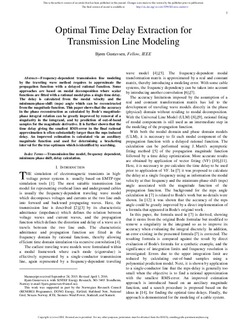| dc.contributor.author | Gustavsen, Bjørn Alfred | |
| dc.date.accessioned | 2016-11-10T08:46:15Z | |
| dc.date.accessioned | 2017-01-19T14:28:23Z | |
| dc.date.available | 2016-11-10T08:46:15Z | |
| dc.date.available | 2017-01-19T14:28:23Z | |
| dc.date.issued | 2016 | |
| dc.identifier.citation | IEEE Transactions on Power Delivery 2016 | nb_NO |
| dc.identifier.issn | 0885-8977 | |
| dc.identifier.uri | http://hdl.handle.net/11250/2427874 | |
| dc.description | - | nb_NO |
| dc.description.abstract | Frequency-dependent transmission line modeling by the traveling wave method requires to approximate the propagation function with a delayed rational function. Some approaches are based on modal decomposition where scalar functions are fitted with a rational model plus a single time delay. The delay is calculated from the modal velocity and the minimum-phase-shift (mps) angle which can be reconstructed from the magnitude function. This paper shows that the accuracy in the phase reconstruction as calculated by Bode's magnitude-phase integral relation can be greatly improved by removal of a singularity in the integrand, and by prediction of out-of-band samples for the magnitude derivative. It is further shown that the time delay giving the smallest RMS-error in the final rational approximation is often substantially larger than the mps induced delay. An improved estimation is calculated via an auxiliary magnitude function and used for determining a bracketing interval for the true optimum which is identified by searching. © 2016 IEEE | nb_NO |
| dc.language.iso | eng | nb_NO |
| dc.title | Optimal Time Delay Extraction for Transmission Line Modeling | nb_NO |
| dc.type | Journal article | nb_NO |
| dc.type | Peer reviewed | nb_NO |
| dc.date.updated | 2016-11-10T08:46:14Z | |
| dc.rights.holder | Copyright (c) 2016 IEEE | nb_NO |
| dc.source.journal | IEEE Transactions on Power Delivery | nb_NO |
| dc.identifier.doi | 10.1109/TPWRD.2016.2609039 | |
| dc.identifier.cristin | 1398752 | |
